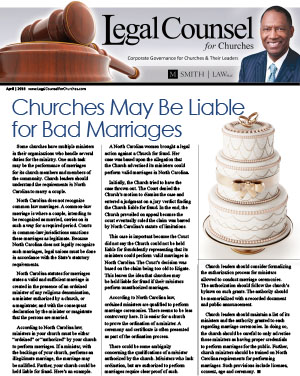Some churches have multiple ministers in their organizations who handle several duties for the ministry. One such task may be the performance of marriages for its church members and members of the community. Church leaders should understand the requirements in North Carolina to marry a couple.
North Carolina does not recognize common law marriages. A common-law marriage is where a couple, intending to be recognized as married, carries on in such a way for a required period. Courts in common-law jurisdictions sanctions these marriages as legitimate. Because North Carolina does not legally recognize such marriages, legal unions must be done in accordance with the State’s statutory requirements.
North Carolina statutes for marriages states a valid and sufficient marriage is created in the presence of an ordained minister of any religious denomination, a minister authorized by a church, or a magistrate; and with the consequent declaration by the minister or magistrate that the persons are married.
According to North Carolina law, ministers in your church must be either “ordained” or “authorized” by your church to perform marriages. If a minister, with the backings of your church, performs an illegitimate marriage, the marriage may be nullified. Further, your church could be held liable for fraud. Here’s an example.
A North Carolina woman brought a legal action against a Church for fraud. Her case was based upon the allegation that the Church advertised its ministers could perform valid marriages in North Carolina.
Initially, the Church tried to have the case thrown out. The Court denied the Church’s motion to dismiss the case and entered a judgment on a jury verdict finding the Church liable for fraud. In the end, the Church prevailed on appeal because the court eventually ruled the claim was barred by North Carolina’s statute of limitations.
This case is important because the Court did not say the Church could not be held liable for fraudulently representing that its ministers could perform valid marriages in North Carolina. The Court’s decision was based on the claim being too old to litigate. This leaves the idea that churches may be held liable for fraud if their ministers perform unauthorized marriages.
According to North Carolina law, ordained ministers are qualified to perform marriage ceremonies. There seems to be less controversy here. It is easier for a church to prove the ordination of a minister. A ceremony and certificate is often presented as part of the ordination process.
There could be some ambiguity concerning the qualifications of a minister authorized by the church. Ministers who lack ordination, but are authorized to perform marriages require clear proof of such.
Church leaders should consider formalizing the authorization process for ministers allowed to conduct marriage ceremonies. The authorization should follow the church’s bylaws on such grants. The authority should be memorialized with a recorded document and public announcement.
Church leaders should maintain a list of its ministers and the authority granted to each regarding marriage ceremonies. In doing so, the church should be careful to only advertise those ministers as having proper credentials to perform marriages for the public. Further, church ministers should be trained on North Carolina requirements for performing marriages. Such provisions include licenses, consent, age and ceremony.

